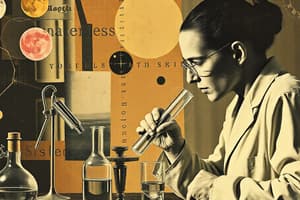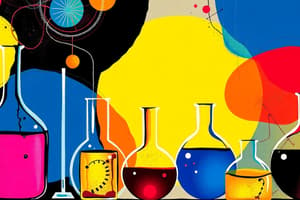Podcast
Questions and Answers
Which scientific principle emphasizes minimizing personal opinions and beliefs when interpreting experimental results?
Which scientific principle emphasizes minimizing personal opinions and beliefs when interpreting experimental results?
- Objectivity (correct)
- Testability
- Skepticism
- Empiricism
A researcher observes a new phenomenon but cannot devise an experiment to confirm or deny it. Which core principle of science is most directly challenged?
A researcher observes a new phenomenon but cannot devise an experiment to confirm or deny it. Which core principle of science is most directly challenged?
- Repeatability
- Falsifiability (correct)
- Objectivity
- Empiricism
A team of scientists publishes findings that another research group cannot reproduce despite following the same experimental design. Which aspect of the scientific method is most directly questioned?
A team of scientists publishes findings that another research group cannot reproduce despite following the same experimental design. Which aspect of the scientific method is most directly questioned?
- Conclusion
- Observation
- Analysis
- Repeatability (correct)
A researcher proposes that increased sunlight exposure causes higher rates of skin cancer. What is the MOST appropriate next step using the scientific method?
A researcher proposes that increased sunlight exposure causes higher rates of skin cancer. What is the MOST appropriate next step using the scientific method?
Which branch of science is primarily concerned with the study of the composition, structure, properties, and reactions of matter at the atomic and molecular level?
Which branch of science is primarily concerned with the study of the composition, structure, properties, and reactions of matter at the atomic and molecular level?
An economist is studying consumer behavior in response to changes in interest rates. Under which branch of science does this research fall?
An economist is studying consumer behavior in response to changes in interest rates. Under which branch of science does this research fall?
Which field of study uses observation, experimentation, and analysis to understand the physical structure, composition, processes, and history of the planet Earth?
Which field of study uses observation, experimentation, and analysis to understand the physical structure, composition, processes, and history of the planet Earth?
Which activity exemplifies how psychology, as a branch of science, can be applied to address real-world issues?
Which activity exemplifies how psychology, as a branch of science, can be applied to address real-world issues?
Which discipline primarily focuses on the systematic study of government, political behavior, and public policy?
Which discipline primarily focuses on the systematic study of government, political behavior, and public policy?
Which of the following is an example of a formal science?
Which of the following is an example of a formal science?
Which of the following units is used to measure luminous intensity in the International System of Units (SI)?
Which of the following units is used to measure luminous intensity in the International System of Units (SI)?
A researcher is studying the effects of a new drug on a group of patients. What ethical consideration requires the researcher to obtain voluntary agreement from the participants before starting the study?
A researcher is studying the effects of a new drug on a group of patients. What ethical consideration requires the researcher to obtain voluntary agreement from the participants before starting the study?
Which tool is most suitable for analyzing the composition of a distant star by studying its interaction with light?
Which tool is most suitable for analyzing the composition of a distant star by studying its interaction with light?
Which activity exemplifies the application of scientific knowledge to improve crop production and livestock management?
Which activity exemplifies the application of scientific knowledge to improve crop production and livestock management?
What distinguishes a scientific theory from a scientific law?
What distinguishes a scientific theory from a scientific law?
In scientific communication, what is the purpose of peer-reviewed journals?
In scientific communication, what is the purpose of peer-reviewed journals?
Which scenario represents a conflict of interest in scientific research?
Which scenario represents a conflict of interest in scientific research?
How does science contribute to policy decisions related to public health?
How does science contribute to policy decisions related to public health?
Flashcards
What is Science?
What is Science?
A systematic approach to understanding the natural world through observation, experimentation, and analysis.
Objectivity (in science)
Objectivity (in science)
Minimizing bias in observations and interpretations.
Empiricism
Empiricism
Relying on evidence obtained through observation and experimentation.
Skepticism (in science)
Skepticism (in science)
Signup and view all the flashcards
Scientific Method
Scientific Method
Signup and view all the flashcards
Physics
Physics
Signup and view all the flashcards
Chemistry
Chemistry
Signup and view all the flashcards
Biology
Biology
Signup and view all the flashcards
Political Science
Political Science
Signup and view all the flashcards
Formal Sciences
Formal Sciences
Signup and view all the flashcards
Logic
Logic
Signup and view all the flashcards
Mathematics
Mathematics
Signup and view all the flashcards
Scientific Theory
Scientific Theory
Signup and view all the flashcards
Scientific Law
Scientific Law
Signup and view all the flashcards
SI Units
SI Units
Signup and view all the flashcards
Data Integrity
Data Integrity
Signup and view all the flashcards
Informed Consent
Informed Consent
Signup and view all the flashcards
Healthcare Advances
Healthcare Advances
Signup and view all the flashcards
Study Notes
Science: A Systematic Endeavor
- A systematic and organized approach to understanding the natural world is achieved through observation, experimentation, and analysis.
- Science involves a dynamic process of inquiry.
- The inquiry process builds and organizes knowledge creating testable explanations and predictions.
- Science relies on empirical evidence, logical reasoning, and skepticism.
- These tools refine and improve our understanding of the universe.
Core Principles of Science
- Objectivity minimizes bias in observations and interpretations.
- Empiricism relies on evidence from observation and experimentation.
- Skepticism questions claims, demanding supporting evidence.
- Testability formulates hypotheses that experimentation or observation can test.
- Falsifiability ensures scientific theories can be proven wrong by evidence.
- Repeatability is when scientific findings are reproducible by other researchers.
Scientific Method
- The scientific method is a systematic approach used to investigate phenomena.
- It's used to acquire new knowledge.
- It's used to correct and integrate previous knowledge.
- Observation identifies a question or problem.
- Hypothesis formulates a testable explanation or prediction.
- Experimentation conducts controlled tests to gather data.
- Analysis identifies patterns or relationships in data.
- Conclusion draws conclusions based on evidence determining if the hypothesis is supported or refuted.
- Communication shares findings through publications and presentations.
Branches of Science
- Natural Sciences study the physical world.
- Physics examines the universe's fundamental constituents, their interactions, and governing laws.
- Chemistry studies matter's composition, structure, properties, and reactions.
- Biology investigates living organisms, their functions, evolution, and environmental interactions.
- Earth Science encompasses the study of Earth's structure, composition, processes, and history.
- Astronomy focuses on celestial objects, the universe, and its evolution.
- Social Sciences study human behavior and societies.
- Sociology examines social structures, interactions, and institutions.
- Psychology studies the mind, behavior, and mental processes.
- Economics analyzes the production, distribution, and consumption of goods and services.
- Anthropology explores human cultures, societies, and their development.
- Political Science investigates systems of government, political behavior, and public policy.
- Formal Sciences are disciplines concerned with formal systems.
- Logic studies the principles of valid reasoning and inference.
- Mathematics focuses on abstract structures, relationships, and patterns.
- Theoretical Computer Science explores the theoretical foundations of computation and information processing.
- Applied Sciences apply scientific knowledge to practical problems.
- They can develop new technologies.
- Engineering uses scientific principles to design and build structures, machines, and systems.
- Medicine applies scientific knowledge to diagnose, treat, and prevent diseases.
- Agriculture uses scientific methods to improve crop production and livestock management.
- Computer Science develops computer systems, software, and algorithms.
Scientific Theories and Laws
- Scientific Theory provides a well-substantiated explanation of the natural world.
- It can incorporate facts, laws, inferences, and tested hypotheses.
- Examples include the theory of evolution by natural selection, and the theory of general relativity.
- Scientific Law is a descriptive statement or equation.
- It reliably predicts events under certain conditions.
- Examples include Newton's law of universal gravitation, and the laws of thermodynamics.
Measurement and Units
- Science relies on precise measurements to quantify observations and experiments.
- The International System of Units (SI) is the standard measurement system in science.
- Length is measured in meters (m).
- Mass is measured in kilograms (kg).
- Time is measured in seconds (s).
- Electric Current is measured in Amperes (A).
- Temperature is measured in Kelvins (K).
- Amount of a Substance is measured in Moles (mol).
- Luminous Intensity is measured in Candelas (cd).
Tools and Technologies
- Scientists use tools and technologies to conduct research and gather data.
- Microscopes magnify small objects for detailed observation.
- Telescopes observe distant objects in space.
- Spectrometers analyze matter's composition by studying its interaction with light.
- Particle Accelerators accelerate subatomic particles to high speeds for interaction studies.
- Computers are used for data analysis, modeling, and simulations.
Scientific Communication
- Scientists communicate findings to share knowledge.
- Peer-Reviewed Journals are scientific publications reviewed by field experts.
- Conferences are meetings where scientists present research and engage in discussions.
- Books and Textbooks provide summaries of scientific knowledge.
- Websites and Online Resources disseminate scientific information.
Ethics in Science
- Ethical conduct is essential in scientific research.
- Integrity, honesty, and responsible practices are necessary.
- Informed Consent requires voluntary agreement from research participants.
- Data Integrity ensures data accuracy and reliability.
- Conflict of Interest requires disclosing potential biases.
- Animal Welfare requires treating research animals humanely.
- Responsible Authorship gives proper credit to all research publication contributors.
Impact of Science on Society
- Science advances technology, improves healthcare, and addresses societal challenges.
- Scientific discoveries lead to new technologies.
- Advances in technology improve our lives.
- Scientific research leads to new treatments, vaccines, and diagnostic tools improving Healthcare
- Scientific research helps us understand environmental issues developing sustainable solutions for the Environment.
- Science drives innovation and economic growth benefiting the Economy.
- Science informs policy decisions on climate change and public health impacting Policy.
Studying That Suits You
Use AI to generate personalized quizzes and flashcards to suit your learning preferences.




